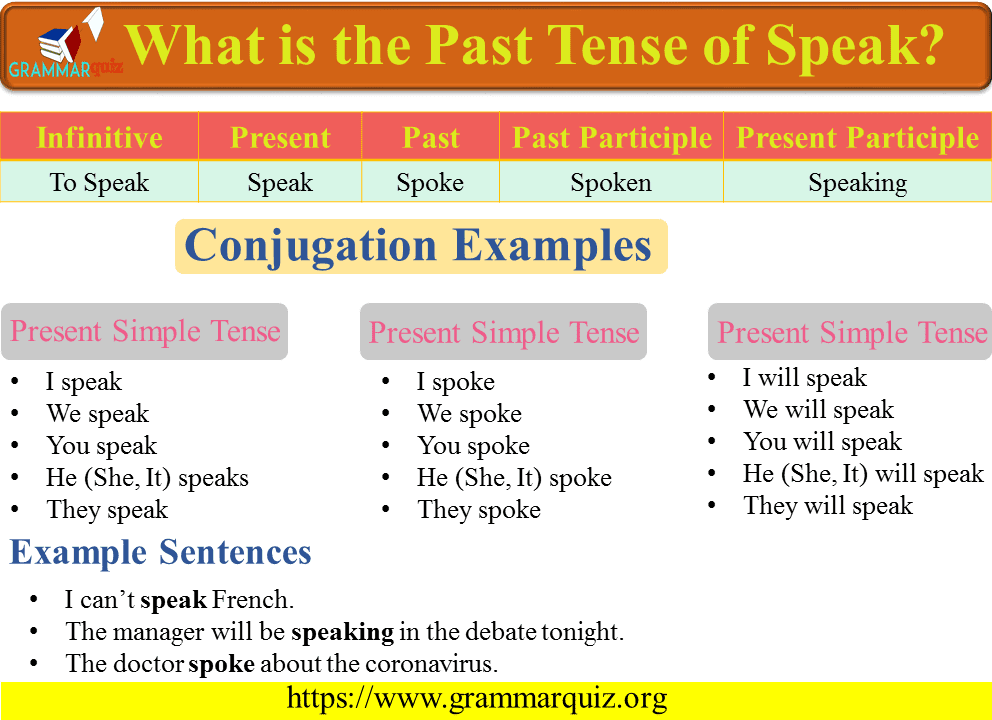
The past tense of speak: The verb speak is an irregular verb. The past and past participle of the verb speak is spoke and spoken, respectively. The principal forms of the verb speak are given below.
Meaning: say words/ formal talk/ to use the voice to produce words
Infinitive: to speak
Perfect Infinitive: to have spoken
Past Form: spoke
Past Participle: spoken
Present Participle: speaking
How Do You Conjugate the Verb Speak in Active and Passive Voice?
Conjugating the Verb Speak Active Voice
Speak Present Simple Tense
- I speak
- He (She, It) speaks
- We/You/They speak
Speak Past Simple Tense
- I spoke
- He (She, It) spoke
- We/You/They spoke
Speak Future Simple Tense
- I will/shall speak
- He (She, It) will/shall speak
- We/You/They will/shall speak
Speak Present Continuous Tense
- I am + present participle of speak
- He (She, It) is + present participle of speak
- We/You/They are + present participle of speak
Speak Past Continuous Tense
- I was + present participle of speak
- He (She, It) was + present participle of speak
- We/You/They were + present participle of speak
Speak Future Continuous Tense
- I will/shall be + present participle of speak
- He (She, It) will/shall be + present participle of speak
- We/You/They will/shall be + present participle of speak
Speak Present Perfect Tense
- I have spoken
- He (She, It) has spoken
- We/You/They have spoken
Speak Past Perfect
- I had spoken
- He (She, It) had spoken
- We/You/They had spoken
Speak Future Perfect
- I will/shall have spoken
- He (She, It) will/shall have spoken
- We/You/They will/shall have spoken
Present Perfect Continuous Tense
- I/We have been + present participle of speak
- He (She, It) has been + present participle of speak
- You/They have been + present participle of speak
Past Continuous Perfect Tense
- I/We had been + present participle of speak
- He (She, It) had been + present participle of speak
- You/They had been + present participle of speak
Future Continuous Perfect Tense
- I/We will have been + present participle of speak
- He (She, It) will have been + present participle of speak
- You/They will have been + present participle of speak
Conjugating the Verb Speak Passive Voice
Speak Present Simple Tense
- I am spoken
- He (She, It) is spoken
- We/You/They are spoken
Speak Past Simple Tense
- I was spoken
- He (She, It) was spoken
- We/You/They were spoken
Speak Future Simple Tense
- I will/shall be spoken
- He (She, It) will/shall be spoken
- We/You/They will/shall be spoken
Speak Present Continuous Tense
- I am being spoken
- He (She, It) is being spoken
- We/You/They are being spoken
Speak Past Continuous Tense
- I was being spoken
- He (She, It) was being spoken
- We/You/They were being spoken
Speak Future Continuous Te
- I will/shall be being spoken
- He (She, It) will/shall be being spoken
- We/You/They will/shall be being spoken
Speak Present Perfect
- I have been spoken
- He (She, It) has been spoken
- We/You/They have been spoken
Speak Past Perfect
- I had been spoken
- He (She, It) had been spoken
- We/You/They had been spoken
Speak Future Perfect
- I will/shall have been spoken
- He (She, It) will/shall have been spoken
- We/You/They will/shall have been spoken
Conjugation of Speak Subjunctive Mood Active Voice
Present
- If I speak
- If we speak
- If you speak
- If he (she, it) speak
- If they speak
Past
- If I spoke
- If we spoke
- If you spoke
- If he (she, it) spoke
- If they spoke
Future
- If I should speak
- If we should speak
- If you should speak
- If he (she, it) should speak
- If they should speak
Conjugation of Speak Subjunctive Mood Passive Voice
Present
- If I be spoken
- If we be spoken
- If you be spoken
- If he (she, it) be spoken
- If they be spoken
Past
- If I were spoken
- If we were spoken
- If you were spoken
- If you were spoken
- If he (she, it) were spoken
- If they were spoken
Future
- If I should be spoken
- If we should be spoken
- If you should be spoken
- If he (she, it) should be spoken
- If they should be spoken
Sentences with Speak (Spoke, Spoken)
- I can’t speak French. (present)
- The baby speaks really well. (present third person singular)
- The manager will be speaking in the debate tonight. (the present participle)
- The doctor spoke about the coronavirus. (past participle)